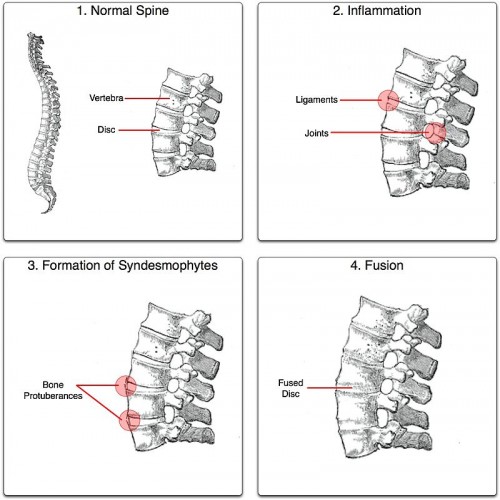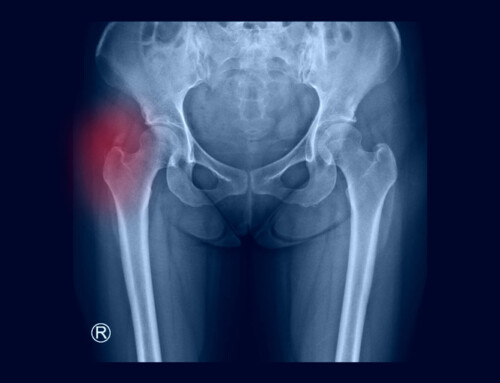What Is Ankylosing Spondylitis? Causes, Symptoms, Treatment Options
By Kaitlyn Mulvaney, SPT
Ankylosing spondylitis is a type of arthritis that affects the joints in the body. Primarily the spine is affected with this condition, but other joints can be affected as well. The sacroiliac joint is commonly involved in individuals with AS. Over time, inflammation in the spine becomes chronic and can lead to severe pain. The severity of AS varies from person to person, but it is a chronic lifelong disease that can be managed.
What causes ankylosing spondylitis?
Ankylosing spondylitis is thought to have a genetic link. There is a protein called HLA-B27 that is considered the “genetic marker” for AS. This protein is found in 95% of the Caucasian population with ankylosing spondylitis. The percentage of the AS population with HLA-B27 differs based on ethnicity.
An individual will be more susceptible to developing AS if they have the HLA-B27 genetic marker, a history in the family of AS and frequent gastrointestinal infections. That being said, the presence of the protein HLA-B27 does not necessarily mean that an individual will develop ankylosing spondylitis. This also means that a blood test for HLA-B27 is not a diagnostic test. There are other genes that experts believe may contribute to AS. Also, an environmental factor, such as a bacterial infection, may need to be present in addition to the protein to cause an individual to develop AS.
Most arthritis related diseases come on in older individuals, but AS is unique in that typically it will present in younger individuals age 17-45.
Effects of ankylosing spondylitis
Not every individual with AS will experience the same intensity of symptoms. Individuals with mild cases may only experience occasional back pain, however, individuals with severe cases may experience fusion of the spine and serious complications. In very extreme cases, AS can be very disabling
There are various problems that ankylosing spondylitis can lead to, but some of them are more common than others. For instance, it is not uncommon for individuals to develop iritis, which is inflammation of the eye.
Problems associated with AS:
- Enthesitis (inflammation where the ligaments attach to the bone)
- Fusion of the vertebrae or ligaments
– Can lead to increase incidence of fractures
– Kyphosis
- Inflammation in the jaw, which can lead to difficulty eating
- Iritis or Uveitis (inflammation of the eye)
- Costochondritis (chest pain that feels similar to cardiac angina)
– Can cause decreased chest expansion
- Fatigue– either due to lack of sleep from pain and discomfort or from the body in a constant state of inflammation
- Hip and shoulder involvement
What is the treatment for ankylosing spondylitis?
There is currently no known cure for ankylosing spondylitis. However, medications and other treatments, such as physical therapy, can help to decrease symptoms and pain. An individual with ankylosing spondylitis is usually managed by a rheumatologist. However, if there are further complications, an ophthalmologist of gastroenterologist may be necessary.
- Exercise: Staying active is a very important part of managing ankylosing spondylitis. Small amounts of exercise throughout the day can be key to keeping pain under control.
- Posture: For many individuals with AS, posture can become a real problem. Practicing good posture can help individuals from becoming kyphotic and fused in a bent over position.
- Medications: It is important that individuals with AS have a rheumatologist that can manage their disease. There are many medications out there to help with AS, including nonsteroidal anti-inflammatory drugs (NSAIDs), disease modifying anti-rheumatic drugs (DMARDs) and biologics (TNF blockers).
- Physical therapy: A physical therapist can help you get started with your exercise plan. They can help educate on proper posture, as well as different stretches and exercises that would be beneficial for an AS patient.
Call our Malta Clinic at (518) 289-5242 or our Queensbury Clinic at (518) 502-1154 today to schedule your appointment with our experienced physical therapy team!
References:
Ankylosing Spondylitis. Spondylitis Association of America. http://www.spondylitis.org/about-spondylitis/ankylosing-spondylitis. October 20, 2016.






